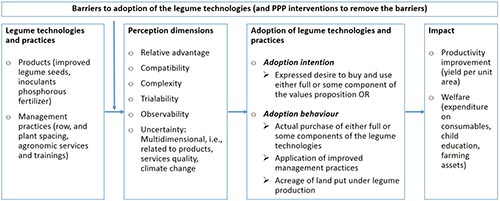N2Africa tests and promotes technologies to enhance legume productivity including improved legume seeds, inoculant, phosphorus fertilizer and improved practices. Adoption by smallholders is hindered by a range of institutional, socioeconomic and biophysical barriers. In line with current thinking on market-based development, Public-Private Partnership (PPP) interventions are used by N2Africa to overcome barriers to adoption. A knowledge gap exists concerning the design and effectiveness of PPPs.
|
I started my PhD studies earlier this year. Putting together theories from economics and marketing with literature on PPPs, we constructed a conceptual framework to better understand smallholders’ adoption decisions of technologies (see Figure 1). |

|
To achieve the intended impact, smallholders need to adopt the technologies. This depends on their perceptions based on exposure to N2Africa dissemination activities. This thesis research (a) explores and identifies adoption barriers, (b) deepens our understanding of the adoption process through exploring the influence of the adoption barriers on smallholders’ perceptions, (c) identifies and develops the PPP interventions that can enhance the adoption behaviour of smallholders, and (d) evaluates the welfare impacts of increasing legume productivity. The first qualitative study is being conducted using a case study methodology to build a theoretical background for the relationship that might exist between the adoption barriers and smallholders’ perceptions. This will lay a background for further studies. Results of the case studies will be communicated in forthcoming podcaster issues.
Tamiru Amanu, International Livestock Research Institute, Ethiopia and Wageningen University & Research, The Netherlands
